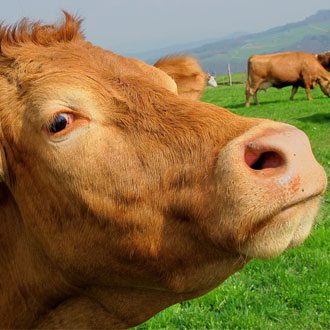Young farmers of the future learn from novel addition to Fallen Stock Collection System…
A group of level 3 agriculture students from Northumberland College have recently witnessed an animal autopsy to learn essential livestock techniques to help their studies and future farming careers.
The twelve students, aged between 17 and 20 years old, attended the workshop located at the Warrens Group fallen stock collection centre in County Durham. The autopsy event was delivered by leading vet, Ben Strugnell, of Farm Post Mortems Ltd.
Mr Strugnell is a pivotal player in the livestock community as he devised a novel addition to the Fallen Stock Collection System, where farmers are offered autopsies on their deceased cattle [fallen stock] with the essential results enabling them to better understand the cause of death and help protect their remaining stock.
Simon Gregory, Lecturer in Sheep Management on Northumberland College’s agriculture course based at Kirkley Hall, said: “This learning curve is a crucial way for our students to better understand why some livestock die. It shows them first-hand how better management and vaccination techniques can save farmers money, time and livestock.”
Simon adds: “Northumberland College prides itself in providing its students with unique experiences that will benefit their current academia but also their future careers. We are able to bring what the young people learn in the classroom and put things into real-life situations so they can explore the bigger picture. This workshop gave them a greater understanding of how disease can directly impact upon an animal’s body, enabling a greater understanding of anatomy.”
The young people saw for themselves the devastating affects some diseases can have on the organs of cattle including an abscess in both the heart and liver and a perforated uterus.
One of the student group, Georgia Stoddart, aged 18 from Gateshead who wants to pursue a career in livestock, said: “We all found watching the autopsy very interesting. It taught us how diseases, if not treated properly, can devastate a herd.
“It was fascinating to see the animal organs up close as we normally only get to see the procedures in text book diagrams.
“We also got to talk with the veterinarian about the report he needs to write for the farmer and how they can learn from the autopsy process.”
Another student was Ethan Parry, 19, from Wallsend. He said: “I learned lots from the autopsy like how the insides of animals work including how bacteria helps the digestion of food.
“Another crucial skill that was reinforced was the correct way to perform a vaccination as the repercussions of doing it the wrong way could prove fatal.”
Since 2003 farmers have been banned from burying or burning carcases of fallen stock and are required to bring in the services of external contractors to professionally dispose of deceased animals from a stillborn piglet to a fallen cow.
Over 4 years ago leading vetenarian Ben Strugnell set up an enterprise in collaboration with the levy board (Agriculture and Horticulture Development Board), where he was offering farmers the opportunity to give fallen stock a full post-mortem  examination.
examination.
The carcass-based diagnostic programme was the largest service of its type anywhere in the country, where farmers could gain a detailed report about their deceased animals and learn from the essential findings. It allows the owner to assess their entire livestock and put in place a plan for the whole farm.
Ben Strugnell works as an independent vet and director of Farm Post Mortems. He has a particular interest in farm animal pathology with his service being mainly used by farmers in conjunction with their own vets.
Ben talks about the importance of young people like the students from Northumberland College observing the workings of the Fallen Stock Collection System. He said: “It’s all about educating the young farmers of the future and giving them access to current agriculture methods and findings that can help them with their studies and career development. I think it’s a wonderful idea for the College to give its students the chance to have a special insight into the world of livestock.
“The educational visit also gives the students an opportunity to talk directly with an industry vet and discuss the reasons behind the death of the animals and how the fatality could be avoided. Time spent down on the farm under real-life conditions can only be beneficial for the young people. It will be a useful component towards their final training and helps to ensure the farming industry continues to be in safe hands for years to come.”
For further information about the agriculture course at Northumberland College please visit www.northumberland.ac.uk and for more details about the work of Ben Strugnell please visit www.farmpostmortems.co.uk
- Log in to post comments

